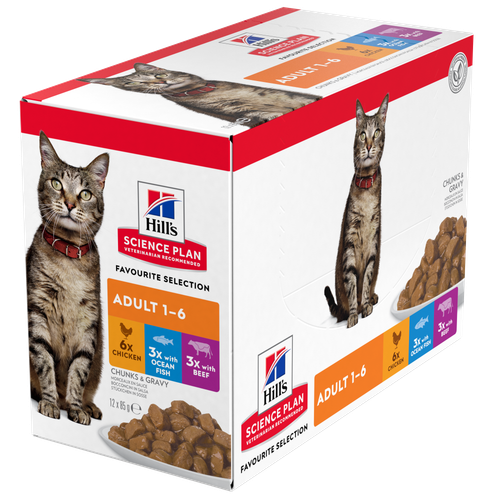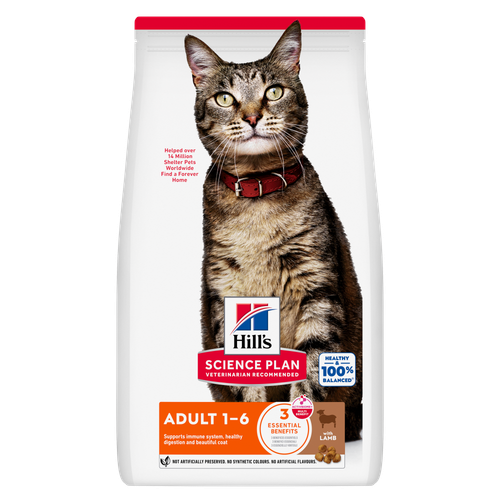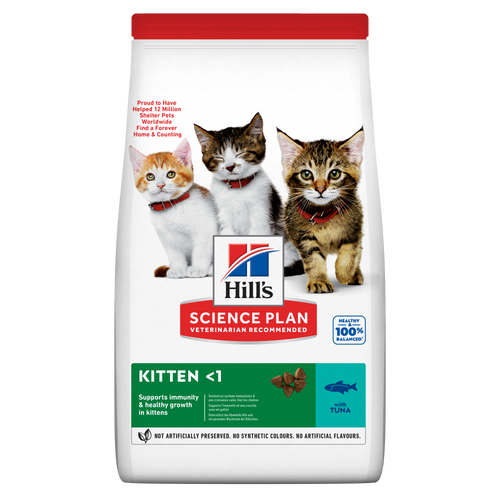
-
Featured products
 Small & Mini Adult Dog Food
Small & Mini Adult Dog FoodHill's Science Plan Small & Mini Breed Adult Dog Food with Lamb & Rice is a complete pet food, specially formulated with ActivBiome+ Multi-Benefit Technology.
Tailored nutrition for the unique needs of small dogs during the prime of their life.Shop Now Perfect Weight Adult Dog Food with Chicken & Vegetables
Perfect Weight Adult Dog Food with Chicken & VegetablesHill's Science Plan Perfect Weight Adult Dog Food with Chicken & Vegetables ia a complete premium dog food for dogs prone to weight gain or who are slightly overweight. This savoury tinned loaf is enriched with ingredients that support healthy weight maintenance & long-lasting weight support.
Shop Now Small & Mini Puppy Dog Food
Small & Mini Puppy Dog FoodHill's Science Plan Puppy Small & Mini Breed Dog Food with Chicken is a complete pet food, specially formulated with ActivBiome+ Multi-Benefit Technology.
100% balanced nutrition to support optimal growth & the immune system.Shop NowFeatured products Adult Cat Food
Adult Cat FoodHill's Science Plan Adult Cat Food with Chicken is a complete pet food, specially formulated with ActivBiome+ Multi-Benefit Technology.
This food is specially formulated to fuel the energy needs of cats during the prime of their life.Shop Now Feline Adult Wet Food
Feline Adult Wet FoodTender chunks in gravy for cats, with high-quality protein to maintain lean muscle. With vitamin E and omega-3s & -6s for healthy skin and balanced minerals to support healthy vital organs.
Shop Now Adult Cat Food
Adult Cat FoodHill's Science Plan Adult Cat Food with Lamb & Rice is a complete pet food, specially formulated with ActivBiome+ Multi-Benefit Technology.
This food is specially formulated to fuel the energy needs of cats during the prime of their life.Shop Now -
Dog
- Dog Tips & Articles
-
Health Category
- Weight
- Food & Environmental Sensitivities
- Urinary
- Digestive
- Joint
- Kidney
Featured articles Proteins
ProteinsTo make a protein, amino acids are linked together in a long chain. The chain is then bundled into to a three-dimensional structure, like a tangled ball of yarn.
Read More The Right Diet For Your Pet
The Right Diet For Your PetIn people, the right diet is very important. If you are eating the wrong way for your metabolism, activity level, age and lifestyle you could end up with health issues.
Read More Show some love with wet foods: a great choice for pets with health issues
Show some love with wet foods: a great choice for pets with health issuesShow some love with wet foods: a great choice for pets with health issues.
Read More -


Concerned that your cat is not eating? It can be hard to tell a picky eating episode from a serious health issue. A change in your cat's routine is a concern, but figuring out the cause is the first step to getting your cat eating again.
Why Isn't My Cat Eating?
Truth: Your cat loves to eat. It's up there on their list of favourite activities, along with sleeping, playing and trying to get their pet parents' attention. But eating is also a basic element of survival, without which your cat's health may rapidly decline.

Changes in Food
Cats are creatures of habit and will typically resist change, especially to their meal plans. Have you recently changed your cat's food? Maybe they are stubbornly refusing to try a new flavour. Cats can take a while to accept new foods, so a slow transition is generally recommended. Your kitty can't go too long without eating, so if they don’t eat for 24 hours, even after offering the old food again, it's time to explore other possibilities for why they're not eating.
Environmental Stress
Your cat's stubbornness can pop up if they are unhappy with their surroundings. According to the Battersea Dogs & Cats Home, cats are very sensitive creatures and a poor appetite is one sign that your cat might be stressed. Possible causes include:
A big change, like a new house, baby or pet.
Disruption to your cat's normal routine.
Guests, unfamiliar people or excessive noise in the home.
If you know these types of things stress your cat, talk to your veterinarian about ways to help your cat relax.
Possible Illness
Digestive issues, such as constipation, colitis and inflammatory bowel disease (or chronic enteropathy), are stressful on your cat's body, leading to loss of appetite, gas, vomiting and diarrhoea. Other underlying illnesses that may affect appetite include kidney disease and dental problems. The PDSA explains that problems like gum disease are painful and can discourage cats from eating, so be sure your veterinarian includes a comprehensive dental exam during every checkup.
Only a vet can diagnose an illness, so contact your vet's office right away with any unusual or significant health changes. You should also take your cat in for a dental checkup if they're refusing dry food or favouring one side of the mouth when chewing.


Tasty Tips
How to Get a Cat to Eat
If your cat is snubbing meals, try expanding their options, exploring new flavour combinations or offering a new form. When trying out new foods, do so gradually to help your cat to acclimate to new flavours and textures. If your cat is reluctant to try a new food, you can try adding a small amount of broth to the dry food or warming the canned food.
International Cat Care advises against forcing your cat to eat or force-feeding with a syringe, as this can create a negative association with eating that can make your cat's appetite problems worse. Instead, they offer lots of ideas for encouraging your cat to eat.
If your cat becomes stressed easily, it's important to think about preparing your cat for parties at your house and planning ahead for introducing them to a new furry friend, which will help them cope with lifestyle changes.
In addition to what your cat eats, take into account where they dine. In their Code of Practice for the Welfare of Cats, the UK Government's Canine & Feline Sector Group warns that cats will not eat if their food is too close to their litter tray. You should also try to position the food bowl away from other animals, in a clean, quiet area with little traffic. Seemingly minor changes can stress out your kitty, so create dedicated cat feeding areas in your house.

When Should I Call the Vet?
Here's a good rule of thumb for pet parents: when in doubt, call your vet.
You and the vet share the goal of keeping your furry friend in tip-top shape, and it's better to err on the side of caution. Contact the vet as soon as you notice a change, whether sudden or gradual, in your cat's behaviour. Questioning why your cat isn't eating is important, especially if it's been more than a day since the last meal. If your kitty does need treatment, the earlier you get started, the better.
Now that you know some causes for appetite loss and how to get a cat to eat, you can take an active role in helping your feline pal get back on the path to full health.


Christine O'Brien is a writer, mom, and long-time cat parent whose two Russian Blues rule the house. Her work also appears in Care.com, What to Expect, and Fit Pregnancy, where she writes about pets, pregnancy, and family life. Find and follow her on Instagram and Twitter @brovelliobrien.
Related products

Hill's Science Plan Sterilised Kitten Cat Food with Salmon is specially formulated with ActivBiome+ Multi-Benefit Technology. This food is carefully formulated for the developmental needs of kittens, so they get the best start in life & grow to their full potential.

Tender chunks in gravy for cats, with high-quality protein to maintain lean muscle. With vitamin E and omega-3s & -6s for healthy skin and balanced minerals to support healthy vital organs.

Hill's Science Plan Adult Cat Food with Chicken is a complete pet food, specially formulated with ActivBiome+ Multi-Benefit Technology.
This food is specially formulated to fuel the energy needs of cats during the prime of their life.

Hill's Science Plan Adult Cat Food with Lamb & Rice is a complete pet food, specially formulated with ActivBiome+ Multi-Benefit Technology.
This food is specially formulated to fuel the energy needs of cats during the prime of their life.
Related articles

Many human foods are dangerous to cats. Read about 5 of the worst toxic food offenders that can kill your cat - and how much it takes to hurt them.

Cats are very clean creatures and your kitten will spend approximately five hours a day grooming herself. In doing so, they'll pick up any loose hairs from their coat.

From essential vitamins & minerals to different types of meat, learn what to look for when choosing the best cat food for your feline.

Selecting the right food for your kitten is a key to quality nutrition and a long, healthy life. Learn more about how to select the right kitten food.

Put your cat on a diet without them knowing
Our low calorie formula helps you control your cat's weight. It's packed with high-quality protein for building lean muscles, and made with purposeful ingredients for a flavorful, nutritious meal. Clinically proven antioxidants, Vitamin C+E, help promote a healthy immune system.
Put your cat on a diet without them knowing
Our low calorie formula helps you control your cat's weight. It's packed with high-quality protein for building lean muscles, and made with purposeful ingredients for a flavorful, nutritious meal. Clinically proven antioxidants, Vitamin C+E, help promote a healthy immune system.

